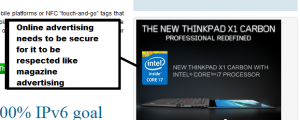Celebrity gossip sites–attractive to malware distributors
Articles
The most dangerous celebrities to look up on Google | BGR.com
Searching for celebrity news on Google can be dangerous for your computer | Panda Security
Malware parasites feed on PerezHilton.com gossip fans | BBC News
My Comments
An issue that has been raised is that searching for the latest news and gossip about a celebrity can be risky for your computer’s security. Panda Security even described it as being of risk to a business’s computer systems because office workers would do it during slow times in their workday. It is though this activity is still today’s equivalent of looking through the gossip magazines at the supermarket checkout or in the doctor’s waiting room.
This is because the Internet has made it easier to push up “fly-by-night” gossip Websites that are laden with malware and have these advertised.
It is also because there is a weakness that exists in the online advertising marketplace is that ad networks and publishers don’t subject the advertising that comes to these networks to thorough scrutiny on a safety perspective. This then allows online advertising to become a breeding ground for malware with such things as “malvertising” where scripted ads are used to “push” malware on to users’ systems. This is a topic I have raised because I am wanting to see the rise of a quality online ad marketplace that has the same level of respect as the advertising seen in traditional print media.
A similar situation happens whenever a new album or movie featuring a popular entertainer is released because sites and torrent files would pop up claiming to offer the material for free. To the same extent, this could include offers of “exclusive” photo, audio and video material relating to the content or its performers for free. The same thing also can happen with surveillance, personal-album or similar material that features celebrities in compromising situations and ends up being “leaked” to the public arena. Again these sites and the torrent “file-of-files” available to download would be a minefield of malware files if you aren’t careful.
The situation becomes worse during the time surrounding entertainment-industry awards events, the release of new headline content featuring the celebrities or whenever there are major personal events affecting these people such as new relationships or relationship breakups. The articles cited that people involved with the Hollywood entertainment scene are more likely to be targeted with fly-by-night malware sites, malvertising attempts and similar skulduggery. but I also would place at risk of this treatment the British Royal Family or past and present popular Presidents of the United States.
What can you do?
- Make sure your regular or mobile computing device is running the latest version of the operating system and you are using the latest version of the Web browser(s) and other software that you surf the Web with. It may also be a good practice to run an up-to-date version of a desktop / endpoint security program which can scan for flaky links and files.
- Most importantly, think before you click! When you are searching for information about a particular show, recording or star, get it “from the horse’s mouth” – go to the publisher’s or broadcaster’s site that relates to what you are after. Also visit the online presence of the mastheads that you know and trust when you are after the celebrity or entertainment-industry news. Examples of these would be those magazines available at the supermarket checkout
- But be careful about anyone offering links to resources that are too good to be true, especially where words like “free” and “exclusive” are bandied around. These sites are the ones that are the malware traps.
- You may find that using tools like search engines or browser plugins that verify Websites’ reputation may be of assistance when it comes to staying away from flaky Websites.
- As for online advertising with sites that are suddenly popular, be careful about following through on these links or make sure you are using desktop security software to protect your computer against malware.
Conclusion
You can engage in the digital equivalent of browsing the gossip mags safely as long as you are sure of the resources that you are heading towards and don’t fall for the bait.


